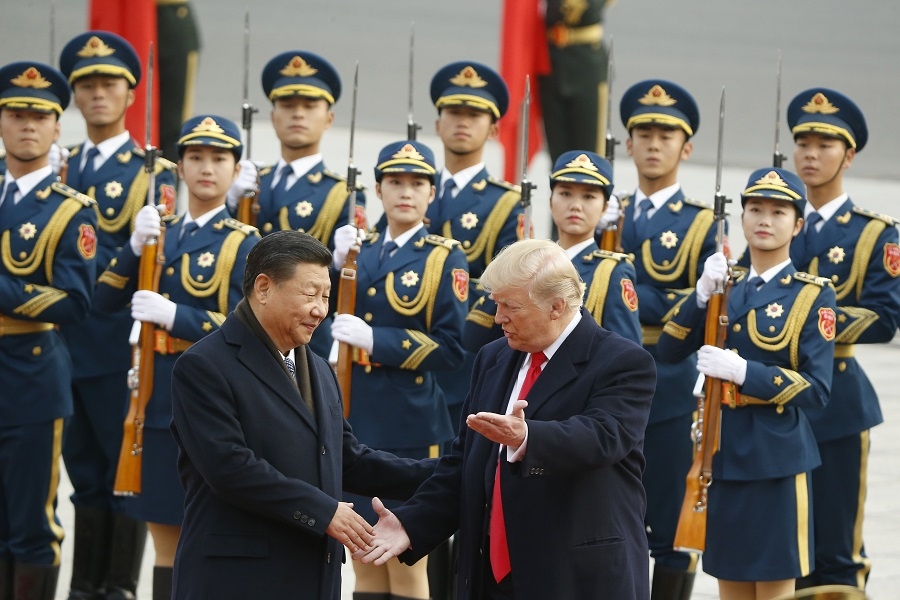
Forbes writes that with China-hater Stephen Bannon gone from the White House, coupled with the reality of the high stakes of waging true trade wars with the Chinese, Barclays is predicting an even keel in 2018 for Trump and Xi Jinping. It is more likely that cooler heads will prevail this time. "In view of the recent developments in U.S.-China relations...we continue to believe the Trump administration has largely used the trade sanction threat as leverage to pressure China on restricting North Korea," Barclays analysts led by Jian Chang in Hong Kong wrote in a report dated Jan. 12. The money shot: "We think the chance of U.S. trade probes leading to meaningful trade sanctions is small. If sanctions were introduced, they would be limited. Even if China responded to potential sanctions with retaliatory actions, likely including delaying already agreed trade deals or imposing tariffs on some U.S. exports to China like soybeans and autos, we believe a full-blown trade war is unlikely given the high economic stakes involved," she wrote. This bodes well for President Trump's trip to the World Economic Forum next week. Trump's become the arch nemesis of the free trade club.
Wall Street Journal reported that the Pentagon is planning to develop two new sea-based nuclear weapons to respond to Russia and China's growing military capabilities, according to a sweeping Defense Department review of nuclear strategy. The planned move has ignited a broad debate over future U.S. nuclear strategy at a time when the nation also faces the threat of proliferation, in particular from North Korea's efforts to expand its arsenal of nuclear weapons and develop long-range missiles capable of delivering them. Supporters of the Pentagon's plan say it is time for the U.S. to update its nuclear forces to deal with changing threats some three decades after the end of the Cold War. Critics worry that the Pentagon's search for more flexible nuclear options could lower the threshold for their use. One weapon, which experts say could be deployed in about two years, is a "low yield" warhead for the Trident missile, which currently is deployed with more powerful warheads on the Navy's submarines that carry ballistic missiles. The U.S. also would pursue the development of a new nuclear-tipped sea-launched cruise missile, reintroducing a system that was retired from the American arsenal in 2010.
Quartz writes that enthusiastic Chinese tourists could be in for their best year yet. China has climbed 10 spots to rank at 75th place in the latest Henley Passport Index, an annual passport ranking by citizenship planning firm Henley and Partners. Published on Jan. 9, the research is based on data from the International Air Transport Association and its own research. According to the index, the ranking is China's highest since 2008. Its lowest rank in the last 10 years was in 2015, when China ranked in 94th place. Chinese tourists can now travel to 60 countries without a visa, according to Henley. This includes the newly added United Arab Emirates, which will no longer require visas (link in Chinese) for them from Tuesday (Jan. 16). (A separate ranking by financial advisory firm Arton Capital, which provides real-time updates, noted that China added 7 nations that offer visa-free and visa-upon arrival in 2017.)
- 2018-01-14 Global investors lick lips as China opens to asset firms
- 2018-01-12 Marriott to China: We Do Not Support Separatists
- 2018-01-11 Chinese media warns the US of 'retaliations' from 'all sides' after new Taiwan bills passed
- 2018-01-10 Inside the growing backlash against China
- 2018-01-09 China's Strategy to Psych Out the West Is Paying Off
- 2018-01-08 Trump is reportedly targeting China in aggressive trade crackdown
- 2018-01-07 Continued Strong Government Expected In China's Economy This Year
- 2018-01-05 China won't be prioritizing growth this year, economist says
- 2018-01-04 China and the US 'are about to ride a bumpy journey,' state news agency says
- 2018-01-03 Russia-China Oil Friendship Makes Crude Costlier for Europe
- Reuters China lifts yuan midpoint to highest in over two years
- Reuters China land minister pledges new residential supply: Xinhua
- Reuters China consumer group seeks answers from Apple about slowing iPhones
- The Washington Post China's GAC to scrap Trump-sounding brand for US market
- The Hill US officials warned Kushner about friendship with Wendi Deng Murdoch: report
- Reuters FACTBOX: China carmakers ramping up electric car investments
- Bloomberg Xi Jinping's Debt Clampdown Has Left a Trail of Dead Projects
- Reuters Google to relaunch map service in China -Nikkei
- news.vice.com Beijing really wants to kick bitcoin out of China
- CNBC Claims China is increasing Africa's debt burden are false, foreign minister says
- www.nature.com China enters the battle for AI talent
- Forbes Western Automakers Can't Afford To Ignore The Threat Of The New 'Made In China'
- Financial Times Lego and Tencent team up for China digital partnership
- Reuters China central government-owned enterprises' 2017 profit 15.2 percent: state media
- Financial Times China reprimands companies calling Tibet and Taiwan independent
- Bloomberg Xi's Economic Adviser Liu He to Represent China at Davos Forum
- Reuters Japan's defense chief criticizes China over submarine near disputed islands
- Wall Street Journal Chinese Yuan at Two-Year High Against Dollar
- uk.reuters.com Germany to include yuan in FX reserves - central banker
- Financial Times China recyclers grind to halt amid crackdown on imported waste
